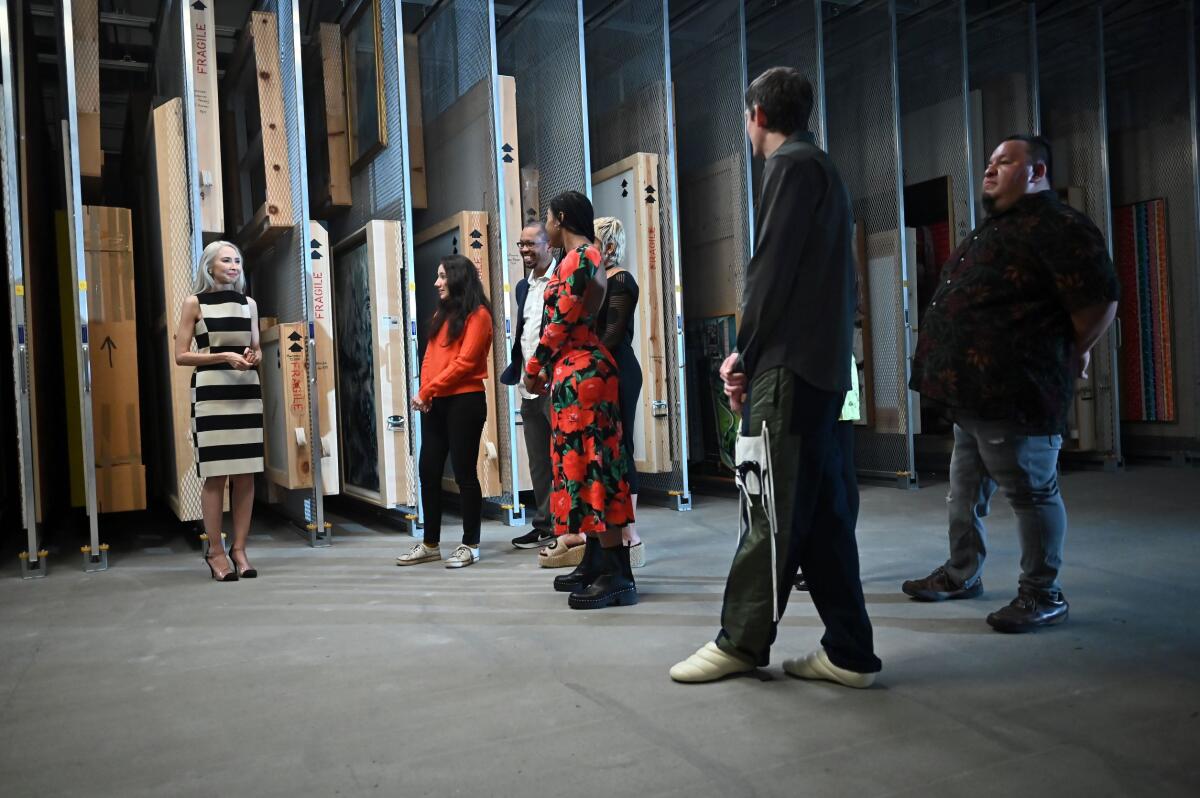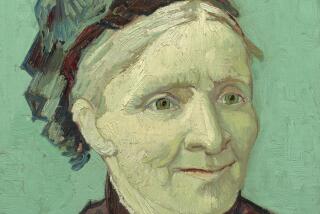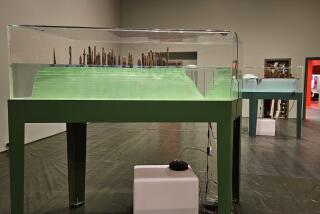Review: Art becomes blood sport in formulaic reality competition âThe Exhibitâ

A little while ago, a study showed that the strongest signal for âmaking itâ as an artist today isnât talent or a master of fine arts degree or group shows. What matters most, according to the research, is endorsement: how quickly an artist can secure institutional support in the form of a solo exhibition at a major gallery or museum. Everything else follows. There are apparently few other ladders to climb.
That explains MTV and the Smithsonian Channelâs newest reality offering, âThe Exhibit: Finding the Next Great Artist,â a show that transforms endorsement into the ultimate prize. Across six episodes, seven rising artists compete for $100,000 and an exhibition at the Smithsonian Instituteâs Hirshhorn Museum and Sculpture Garden in Washington, D.C. Contenders range from rising stars (Baseera Khan, whoâs been reviewed in Artforum, Frieze and the New Yorker) to the up-and-coming (Misha Kahn, whose âWatermelon Partyâ was exhibited at Dries Van Notenâs L.A. flagship in 2021) to the established but overlooked (Frank Buffalo Hyde, whose work is held by the Institute of American Indian Arts in Santa Fe).
In a familiar formula, the artists have several hours to make one âcommissionâ in response to a given theme â gender, social mediaâ and their work is critiqued by a rotating panel of judges, including the artist Adam Pendleton and writer Kenny Schachter. After six weeks, one artist will vault to a level of visibility that typically only megagalleries provide. For artists who canât depend on traditional platforms always working in their favor, the show offers a recourse to a prejudicial gallery system and an opportunity for them to expand their audience.
Still, these gladiator games in the cultural arena are a tacit validation of the destructive belief that culture is a blood sport. Artists already compete with each other for validation, resources and attention, and âThe Exhibitâ only exacerbates the problem by framing it as entertainment.
This isnât the first show cast from this mold. In 2010, Bravoâs âWork of Art: The Next Great Artist,â produced by the company behind âProject Runwayâ and âTop Chef,â exploited a tidy parallel between internecine art-world drama and familiar conceits of reality TV. The show also offered a $100,000 cash prize as well as a solo exhibition at the Brooklyn Museum, where one trustee resigned in protest, citing the museumâs perception as âa party place and a center of celebrity.â The critic Jerry Saltz penned an apologia for his role as a judge on the first season, describing it as âbad for art.â (He subsequently returned for the next season.)
This article was originally on a blog post platform and may be missing photos, graphics or links.
After winning the second and final season, Kymia Nawabi told Hyperallergic: âUnfortunately, the show has not really impacted my career in very obvious ways (yet). I thought there would be some galleries interested in my work: nope. I thought I was going to make a ton of new sales: nope.â Despite decent ratings, âWork of Artâ was canceled and succeeded by the even more short-lived âGallery Girls,â which followed several upstarts in New York Cityâs glamorous gallery scene and ended, tellingly, when one cast member chose a job at a luxury concierge over an internship at a prestigious art advisory.
âThe Exhibitâ wisely holds its institutional affiliation at a calculated distance. Melissa Chiu, the Hirshhorn director and the showâs chief judge, opens the competition by describing the contemporary art museum as âthe wild childâ of the Smithsonian. Hosted by MTVâs Dometi Pongo, itâs certainly a bolder and more irreverent show than its sumptuous closeups of wet paint and dim galleries might have you believe, more aligned with the museumâs high-profile initiatives with such contemporary artists asBarbara Kruger and Nicolas Party. Following in the wake of less cutthroat craft tournaments like âThe Great Pottery Throw Downâ and âBlown Away,â the show seeks to cultivate a congenial vibe, forgoing weekly eliminations. In its earnest embrace of sportsmanship, âThe Exhibitâ wants to renegotiate a parasocial relationship to reality TV and inject some much-needed levity into the rarefied and often forbidding province of High Art.
Yet, within 10 minutes factions and villains emerge as predictable tropes. Pedigreed artists lapse into MFA jargon as they trash talk the self-taught painters, who find camaraderie and motivation in being ostracized from the mainstream; sculptors and mixed-media artists are pitted against the painters and draftspeople in a gentle parody of centuries-long academic debates. The Indigenous painter Frank Buffalo Hyde, for example, criticizes the attention given to young, institutionally validated artists over those whoâve long âdone the workâ â a fair critique, though one whose cursory treatment here typecasts the artist and sets up an ageist conflict.
Rivalry can be generative. It can sustain creativity over long careers and push the bounds of artistic experimentation. But this sense of competition is frustratingly at odds with an issue-of-the-week format that expects artists to fashion topical (and legible) work on demand.
Contestants are judged for their originality, quality of execution and strength of concept â a set of criteria so universal that itâs essentially valueless. In the first crit, featuring works about gender, Misha Kahn is dinged for an overly ambitious resin sculpture of a banana (âa novelty toy,â says Schachter). Visibly unimpressed, Pendleton dismisses Jamaal Barberâs vaguely Cubist charcoal portrait of a two-gendered sitter as âredundant,â and knocks Jillian Mayerâs olfactory work that off-gasses hormones for failing to âactivate the space.â Not only is this familiar criticism, but it also offers no sense of vision and trajectory to its subjects. If âThe Exhibitâsâ own judges donât even buy the showâs promise that the museum can play kingmaker for a new class of artists, why should we?
Each competitor could have been granted $100,000 for less than the production budget, and the showâs cash prize doesnât even match âWork of Artâs,â accounting for inflation. Baseera Khan, âThe Exhibitâsâ most established artist, already had a well-received solo exhibition at the Brooklyn Museum. What do they stand to gain? The prize exhibition is only a single work: the winnerâs sixth commission for the season finale. While thatâs hardly the âexhibit of a lifetimeâ promised in the trailer, the shrine to the spectacle is sure to be, in Pongoâs words, âcareer defining.â
âThe Exhibit: Finding the Next Great Artistâ
Where: MTV
When: 10 p.m. Friday
Streaming: SmithsonianChannel.com
Rating: TV-14 (may be unsuitable for children under the age of 14)
More to Read
The biggest entertainment stories
Get our big stories about Hollywood, film, television, music, arts, culture and more right in your inbox as soon as they publish.
You may occasionally receive promotional content from the Los Angeles Times.










